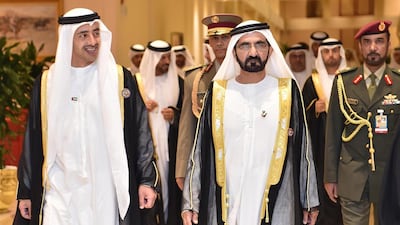DOHA // A police force spanning Gulf countries, a joint navy to be based in Manama and a combined military command.
The plans announced at the end of the GCC’s 35th annual summit indicate that not only is the Arabian Peninsula facing unprecedented security threats, but that a unified front to tackle those threats takes precedence over the six nation’s political differences.
The dangers posed to the stability of Gulf countries appears to have fundamentally altered the security calculations of the GCC states and drawn them closer together. At Tuesday’s summit in Doha, leaders highlighted the need to work together amid the mushrooming conflicts in the region.
The show of unity was a far cry from nine months ago when Saudi Arabia, the UAE and Bahrain recalled their ambassadors from Qatar over Doha’s support for the Muslim Brotherhood.
The diplomatic crisis made 2014 one of the most turbulent years in the GCC’s history, yet it appeared on Tuesday that the Gulf’s leaders had set those differences aside for now.
The need for a strong, united front has rarely been greater. The extremist group ISIL still controls vast swathes of territory in Iraq and Syria and the new government in Baghdad remains loyal to Iran. In Yemen, Shiite Houthi rebels have taken over key parts of the country, while Al Qaeda in the Arabian Peninsula remains unvanquished. In much of North Africa, extremist groups continue to carry out attacks, with Islamist militias having taken over Libya’s capital, Tripoli.
Recent weeks have provided reminders as to why the GCC must be vigilant. ISIL claimed a recent attack on a foreigner in Riyadh and eight Shiites were killed in the country’s Eastern province. In Abu Dhabi, a woman who officials said acted alone stabbed an American teacher to death in a shopping mall and planted a crude bomb that was discovered before exploding.
The phenomenon of terrorism requires us to “take all necessary measures to confront and eradicate its roots and address its real political, social, and economic causes,” Qatar’s Emir Tamim bin Hamad Al Thani said in his speech to the summit.
The joint police force and a combined naval operation are expected to be only the first steps. A joint military command based in Riyadh, to which all the GCC countries have pledged forces, may soon follow as well.
The police force, known as GCC-Pol, will be headquartered in Abu Dhabi and aim to improve cooperation against terrorism, according to Qatari foreign minster Khalid bin Mohammed Al Attiyah. It is not yet clear how many officers will be involved and how it will operate across the GCC’s borders.
A challenge for the force could arise for GCC-Pol if authorities in one country ask it to detain or question a citizen in another.
There were few details given on the joint naval force other than that it would be based in Bahrain, an indication that its primary purpose would be as a deterrent to Iranian ambitions in the region.
Among those gathered at the Doha meeting, there was a sense that fundamental changes were needed. The region is “reshaping itself on a weekly basis,” said a delegate, commenting on the spiralling unrest.
Creating an environment where ISIL militants are not a concern and fundamentalists lose power will take time.
In the nearer term, the strengthening of joint military and police capabilities is critical to combating the threat posed by extremists, whether they are operating as a group or acting alone.
Though all GCC states have pledged a tough line against extremists such as ISIL, the countries will face difficulties in reaching a consensus on how best to use the new forces, as their views on the regional turmoil are not always the same.
The “assumption that member nations of the GCC share identical security, political and economic concerns appears to woefully underestimate the significant policy differences that have always been there ... some of which seem to have widened – not narrowed – over time,” said Fahad Nazer, an analyst at the US-based consultancy JTG and a former political analyst at the Saudi embassy in Washington.
“While Saudi Arabia, the UAE and Bahrain seem to share many of the same concerns and have elected to take forceful positions on a number of conflicts in the region, Kuwait’s position has been more nuanced and Oman has seemingly publicly refused to adopt the same policies of the aforementioned three, preferring a more ‘neutral’ posture, especially regarding Iran.”
Still, the focus on security has for now created an environment were GCC states have chosen to set aside internal differences.
Facing extremists’ campaigns, the GCC decided better together than apart.
jvela@thenational.ae

